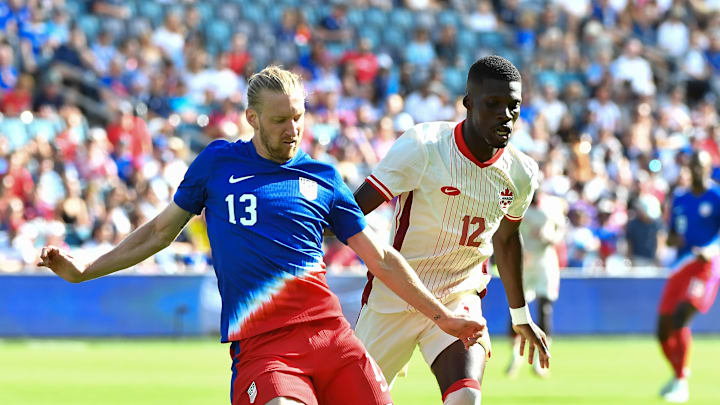Canada, usually the “little brother” in North American soccer, steamrolled the U.S. in a 2-1 win that, honestly, could’ve been way worse. Saturday’s game wasn’t just some friendly match — it was a statement. The USMNT (U.S. Men’s National Team) is in deep trouble, while Canada is climbing to the top of CONCACAF with the swagger and grit of a real powerhouse. This isn’t just a bump in the road; this is a flashing red warning sign, one you ignore at your own peril.
Jesse Marsch didn’t mince words — or actions. Before the game, he made it clear how he felt about the state of U.S. soccer, ruffling a lot of feathers. But the real knockout punch happened on the field, where Canada dismantled any trace of an organized, motivated American team. Sure, the scoreline reads 2-1, but let's be real, that was generous. It was a beatdown, plain and simple.
Follow MLS Multiplex on X (Twitter).
From the start, it was obvious: Canada came to play — hard. The energy was almost tangible, like their players had been injected with pure adrenaline. Jacob Shaffelburg of Nashville SC capitalized on a massive American defensive blunder, calmly slotting in the opening goal with a composure only a team on the rise could pull off. By that point, the U.S. was already spinning, and it felt like Canada had an extra player on the field. The pressure, the pace, the confidence — it was all Canada. Meanwhile, the U.S. looked like a stalled car stuck on the side of the highway.
And if the first half was rough, the second half was a nightmare. Jonathan David, who’d been tormenting the U.S. defense all game, doubled the lead with a goal that pretty much summed up the American disconnect. A sloppy pass from Tim Ream, a fierce recovery by David, and bam — another Canadian goal, another nail in the USMNT coffin. Canada, hungry for victory, seized on every American mistake with the precision of a seasoned hunter.
So, where was the American fight? That grit that’s always been the team’s calling card? If this game made one thing crystal clear, it’s that the issue isn’t tactical — it’s mental. After the match, Chris Richards admitted the team lacked intensity, that drive to win challenges and outrun their opponents. And that’s the kicker. Soccer is all about mentality, and Canada’s got it in spades. It’s almost like the U.S. was banking on pure talent to carry them through, but that’s not how this works. If you don’t have that fire in your eyes, you’re gonna lose — and that’s exactly what happened.
It’s not like the U.S. is short on talent. They’ve got plenty of that. But soccer’s about so much more than individual skill. It’s about teamwork, hard work, and leaving everything on the field. Canada showed up ready to fight like it was a World Cup final, while the U.S. treated it like a preseason scrimmage, just getting their legs warmed up.
So, who’s to blame? A lot of fingers are pointing at interim coach Mikey Varas, who’s been filling in while the U.S. federation drags its feet hiring Mauricio Pochettino. Sure, it’s easy to heap all the blame on the coach, but let’s be honest — the lack of fight and the apathy didn’t just pop up overnight. Gregg Berhalter, the previous coach, faced criticism for failing to get the most out of the squad during the Copa América, and his firing was just the tip of a much bigger iceberg. Now, Varas is dealing with a team that’s not only disorganized tactically but also clearly unmotivated. Even he admitted after the game that the team wasn’t prepared mentally or tactically.
American fans aren’t buying the excuses. Social media blew up with calls to hire Pochettino ASAP, like the Argentine coach is some kind of magic fix for all the problems. Sure, a big-name coach could help steady the ship, but let’s not pretend he’s gonna work miracles with a team that seems to have forgotten what it means to wear their country’s jersey with pride. Meanwhile, Canada’s rolling along, growing in confidence and staking their claim as CONCACAF’s new kings.
It’s ironic, really, because the U.S. has been here before. This isn’t the first time the team’s struggled with that “too big to fail” mindset, but Kansas City brought a harsh reality check. And what’s more alarming? The future doesn’t look too bright, at least in the short term. Sure, there’s still time to turn things around before the big tournaments like the 2026 World Cup, which will be held in the U.S., but the clock’s ticking.
